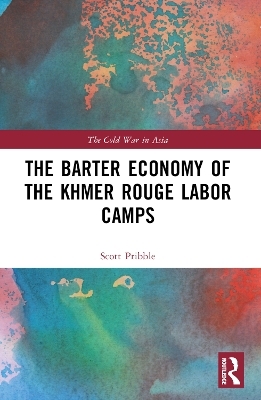
The Barter Economy of the Khmer Rouge Labor Camps
Seiten
2023
Routledge (Verlag)
978-1-032-38702-4 (ISBN)
Routledge (Verlag)
978-1-032-38702-4 (ISBN)
Pribble investigates the barter economies that developed in many of the labor camps established under the Khmer Rouge in Cambodia. A fascinating study of the human consequences of imposing rigid ideology, that will be of particular interest to scholars and students of political history and Southeast Asian history.
Pribble investigates the barter economies that developed in many of the labor camps established under the Khmer Rouge in Cambodia.
When the Khmer Rouge abolished currency and markets in 1975, starving Cambodians created underground exchanges in labor camps throughout the country, bartering luxury items for food and other necessities, while simultaneously undermining the regime’s ideological goals of eliminating any traces of capitalism in Democratic Kampuchea. Pribble asserts three key points about the barter economy in the Khmer Rouge labor camps. First, the underground exchanges in Democratic Kampuchea provided food and medicine for desperate people subsisting under a totalitarian regime, saving the lives of countless Cambodians. Second, bartering was the riskiest way to obtain food because it was dependent upon the discretion of two or more individuals from different social classes under the threat of violent punishment, thereby altering the social dynamics of the camps. Finally, despite the regime’s extreme efforts to eliminate foreign influence from the country and impose communist ideology on millions of citizens, basic forms of market capitalism and a demand for superfluous luxury goods persisted in labor camps throughout the country.
A fascinating study of the human consequences of imposing rigid ideology, that will be of particular interest to scholars and students of political history and Southeast Asian history.
The Open Access version of this book, available at www.taylorfrancis.com, has been made available under a Creative Commons Attribution-Non Commercial-No Derivatives 4.0 license.
Pribble investigates the barter economies that developed in many of the labor camps established under the Khmer Rouge in Cambodia.
When the Khmer Rouge abolished currency and markets in 1975, starving Cambodians created underground exchanges in labor camps throughout the country, bartering luxury items for food and other necessities, while simultaneously undermining the regime’s ideological goals of eliminating any traces of capitalism in Democratic Kampuchea. Pribble asserts three key points about the barter economy in the Khmer Rouge labor camps. First, the underground exchanges in Democratic Kampuchea provided food and medicine for desperate people subsisting under a totalitarian regime, saving the lives of countless Cambodians. Second, bartering was the riskiest way to obtain food because it was dependent upon the discretion of two or more individuals from different social classes under the threat of violent punishment, thereby altering the social dynamics of the camps. Finally, despite the regime’s extreme efforts to eliminate foreign influence from the country and impose communist ideology on millions of citizens, basic forms of market capitalism and a demand for superfluous luxury goods persisted in labor camps throughout the country.
A fascinating study of the human consequences of imposing rigid ideology, that will be of particular interest to scholars and students of political history and Southeast Asian history.
The Open Access version of this book, available at www.taylorfrancis.com, has been made available under a Creative Commons Attribution-Non Commercial-No Derivatives 4.0 license.
Scott Pribble is a San Francisco-based historian, specializing in twentieth and twenty-first-century Cambodia.
Introduction 1. Revolution and the Labor Camps 2. The Abolition of Currency and Its Ideological Roots 3. Origins of the Barter Economy 4. Substitute Currencies: Rice and Gold 5. Other Substitute Currencies 6. Perils and Punishments 7. Chinese Khmers in the Underground Economy 8. Khmer Women and the Barter Economy 9. Base People versus New People 10. Cadres, Watches, and Lighter Chains 11. Aftermath Conclusion
| Erscheinungsdatum | 02.03.2024 |
|---|---|
| Reihe/Serie | The Cold War in Asia |
| Verlagsort | London |
| Sprache | englisch |
| Maße | 156 x 234 mm |
| Gewicht | 322 g |
| Themenwelt | Geisteswissenschaften ► Philosophie |
| Naturwissenschaften ► Geowissenschaften ► Geografie / Kartografie | |
| Sozialwissenschaften ► Soziologie ► Spezielle Soziologien | |
| Wirtschaft ► Volkswirtschaftslehre | |
| ISBN-10 | 1-032-38702-5 / 1032387025 |
| ISBN-13 | 978-1-032-38702-4 / 9781032387024 |
| Zustand | Neuware |
| Informationen gemäß Produktsicherheitsverordnung (GPSR) | |
| Haben Sie eine Frage zum Produkt? |
Mehr entdecken
aus dem Bereich
aus dem Bereich
über eine faszinierende Welt zwischen Wasser und Land und warum sie …
Buch | Hardcover (2023)
dtv (Verlag)
24,00 €
Buch | Hardcover (2024)
Schweizerbart'sche, E. (Verlag)
24,00 €


